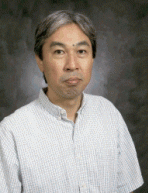


Ph.D., Toyama Medical and Pharmaceutical University, Japan
Women receiving hormone replacement therapy (HRT) have increased risks of breast, ovarian, and endometrial cancers. Our research focuses on establishing the carcinogenic mechanisms of equine and human estrogens prescribed in HRT and evaluating the genotoxicity of these hormones to humans. We are identifying DNA adducts induced by these estrogens, exploring the mutagenic potential and rates of repair of estrogen-derived DNA adducts, and determining the level of the DNA adducts in women receiving HRT. We have found that long-term treatment of these estrogens promotes mammary tumors in ACI rats, a preferred animal model for studying human sporadic breast cancer. Based on the carcinogenic mechanism of estrogens, we have created safer halogenated estrogens lacking tumorigenic potential while retaining estrogenic potential. These agents could be safer alternatives to the carcinogenic estrogens now in use for HRT and also applicable to prevent osteoporosis.
An increased incidence of endometrial cancer has been observed in breast cancer patients treated with tamoxifen and in women receiving tamoxifen for chemoprevention. The long-range goals of this research are to establish the mechanism for the genotoxic action of tamoxifen, evaluate the genotoxicity of tamoxifen to humans, and identify safer anti-estrogens for use in endocrine therapy and the chemoprevention of breast cancer. Based on the genotoxic mechanism of tamoxifen, we have created safe antiestrogens SS1020 and SS5020 lacking genotoxic and estrogenic potential while having high anti-tumor potential. Such strategies could provide safe antiestrogen alternatives to breast cancer patients as well as women at a high risk of developing this disease.
Dietary intake of soy products, especially isoflavones, appears to reduce the risk of various diseases, including breast cancer in women. However, excluding preventive studies using dietary soy products, the anti-cancer activity of isoflavones and their mechanism have not been extensively studied. We have found that daidzein and its metabolite equol have strong anti-breast cancer potential. The intake of these anti-cancer isoflavones could improve human health.
Recents
Kim, S. Y., Suzuki, N., Y. R. Santosh Laxmi, and Shibutani, S. Genotoxic mechanism of tamoxifen in
developing endometrial cancer. Drug Metab. Rev. 36, 199-218 (2004).
Okamoto, Y., Liu, X., Suzuki, N., Okamoto, K., Kim, H. J., Y. R. Santosh Laxmi, Sayama, K., and Shibutani, S. Equine estrogen-induced mammary tumors in rats. Toxicol. Lett. 193, 224-228 (2010).
Y. R. Santosh Laxmi, Liu, X., Suzuki, N., Kim, S. Y., Okamoto, K., Kim, H. J., Zhang, G., Chen, J. J., Okamoto, Y., and Shibutani, S. Anti-breast cancer potential of SS1020, a novel antiestrogen lacking estrogenic and genotoxic actions. Int. J. Cancer 127, 1718-1726 (2010).
Suzuki, S., Liu, X., Y. R. Santosh Laxmi, Okamoto, K., Kim, H. J., Zhang, G., Chen, J. J., Okamoto, Y., and Shibutani, S. Anti-breast cancer potential of SS5020, a novel benzopyran antiestrogen. Int. J. Cancer 128, 974-982 (2011).
Liu, X., Suzuki, N., Y. R. Santosh Laxmi, Okamoto, Y., and Shibutani, S. Anti-breast cancer potential of daidzein in rodents. Life Sciences 91, 415-419 (2012).
Okamoto, Y., Jinno, H., Itoh, S., and Shibutani, S. Carcinogenic potential of fluorinated estrogens in mammary tumorigenesis. Toxicol. Lett. 318, 99-103 (2020).
Okamoto, Y., Jinno, H., Itoh, S., Shibutani, S. Less carcinogenic chlorinated estrogens applicable to hormone replacement therapy. Int. J. Mol. Sci. 22, 7222 https://doi.org/10.3390/ijms22137222 (2021).